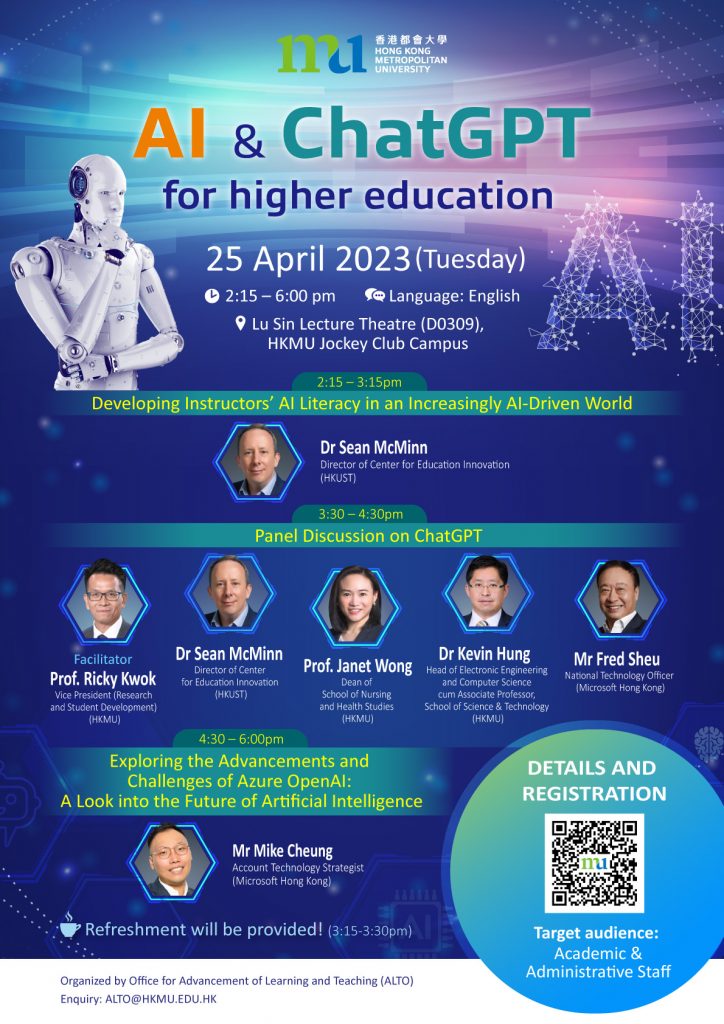|
Date/ Time/ Venue |
Theme/Topic/Speaker(s) |
Synopsis |
Registration |
| 1 |
8 Jan (Mon)
2:30pm – 3:15pm
Seminar
(E0311, JCC)
|
[SoTL in Action]
Why do SoTL?
Prof. Chng Huang Hoon
Prof. Adrian Lee
National University of Singapore
|
As educators, a key question we need to ask is “How do we know our students are learning?” In addition to paying attention to student feedback about their course experience, we believe a crucial part of the answer lies in the instructor's thoughtful reflection on pedagogy and the systematic inquiry into how course design, assessment and classroom practice may have made a difference in students' achievement of specific course learning outcomes. In this seminar, we will iterate the key elements of a SoTL inquiry (see Peter Felten, 2013), and underscore the importance of adopting a reflective and scholarly stance in the way we teach in order to elucidate the ways our students are or are not learning. |
Link |
| 2 |
8 Jan (Mon)
3:45pm – 5:15pm
Workshop
(D0811, JCC)
|
*Parallel session*
[SoTL in Action]
Telling our SoTL stories in the Humanities
Prof. Chng Huang Hoon
National University of Singapore
|
A key feature of practices in the Humanities is a focus on story-telling or narrative. Doing SoTL in the Humanities essentially means providing a narration of our teaching practice and the impact on student learning outcomes. With each narration, over time, we hope to arrive at what Clifford Geertz called a “thick description”, an enriched tale about our practice. In this session, my aim is to get all of us to come up with our own answers to
- What are your stories about your teaching and your student learning?
- How has these stories changed over each iteration of your course?
- What has motivated these transitions or shifts from one story to another?
- Knowing what your specific stories are, how can you facilitate the change(s) to improve your teaching and your student learning?
While the language in which we approach SoTL may differ from the language used in STEM SoTL, I hope to show that we are ultimately still trying to arrive at the same endpoint, which is to enhance student learning experience and outcomes. Some examples of SoTL investigation in the Humanities will be used to illustrate the SoTL stories educators in the Humanities tell.
|
[Quota: 50]
Link
|
| 3 |
8 Jan (Mon)
3:45pm – 5:15pm
Workshop
(D0808, JCC)
|
*Parallel session*
[SoTL in Action]
Taking a quantitative approach to SoTL
Prof. Adrian Lee
National University of Singapore
|
Pat Hutchings and Lee Shulman said that “SoTL is integrating the experience of teaching with the scholarship of research.” Many of us have disciplinary research skills that are quantitative in nature. How can we apply such research skills to make our students learning visible? Can we rely on student reports of learning? If not, can we identify the direct evidence that will show that students have learnt? In this session, we will look at how to design a SoTL project that identifies what works and why it works. In identifying what works, we seek evidence that is accessible to our research skills and that shows the effectiveness of our teaching approaches. A challenging problem in of itself, but perhaps a more challenging problem for our skill set may be to identify why it works. To answer this question, we will need to employ some of the qualitative approaches more familiar to research in the Humanities. Insights from answering the second question offer us the power to make reasoned decisions for how we may want to change our teaching in the future. |
[Quota: 50]
Link
|
| 4 |
9 Jan (Tue)
9:30am – 10:45am
Seminar
(E0311, JCC)
|
[SoTL in Action]
Panel Discussion about SoTL
Prof. Chng Huang Hoon
Prof. Adrian Lee
National University of Singapore
Mr Kevin Chu
Senior Lecturer
B&A
Dr Edsoulla Chung
Assistant Professor
E&L
Prof. Ricky Kwok
Vice-President (Research and Student Development)
PO
|
This panel discussion aims to engage the audience in conversation about SoTL, so that we can learn from one another’s journey, wherever we may be situated.
The exchange can include our stories about how we each may have started our SoTL journey or thinking about how we may begin this work, deliberating about decisions relating to suitable data and analysis when undertaking SoTL projects, as well as discussing opportunities and challenges. We would like this to be a dialogue rather than a question-and-answer session so that we can learn from one another’s experiences.
To ensure a more interactive discussion, we invite you to pre-submit 3-5 specific questions related to SoTL issues when completing your registration form.
|
Link |
| 5 |
9 Jan (Tue)
11:00am – 12:00nn
Seminar
(E0311, JCC)
|
[Student engagement]
Sharing about Community Development and Leadership
Prof. Chng Huang Hoon
National University of Singapore
|
The Chua Thian Poh Community Leadership Centre at the National University of Singapore was established in 2017 and in its relatively short history, it has grown from being an informal leadership platform for student engagement to a formalized curriculum offering both a Certificate and Minor Degree to all NUS undergraduate students. In this 45-minute sharing, I will provide a brief developmental history of the Centre’s evolution and share the Centre’s vision, mission, curriculum, and students’ research with community partners. I hope to use this platform to discuss with the audience the possibility of partnership and how we can work together to enrich our students’ learning. |
Link |
| 6 |
9 Jan (Tue)
2:30pm – 3:30pm
Seminar
(E0311, JCC)
|
[Pedagogical Principles and Practices]
Sharing about Blended Learning and Teaching
Prof. Adrian Lee
National University of Singapore
|
Student learning is positively influenced by the amount of active participation in the learning process. Technology is often leveraged as means to engage students, although care should be taken to recognise the pedagogical advantage of the technology rather than its ability purely to engage. Blended learning is a relatively recent model that, by combining face-to-face activities with online experiences, effectively incorporates technology into education. For example, in the flipped classroom approach, technology is used to facilitate the transmission of content and so allow for the repurposing of face-to-face classroom time for activities that are likely to lead to higher-order learning outcomes. In this sharing, I want to highlight the elements of blended learning that have the potential to lead to effective, efficient, and flexible learning. |
Link |
| 7 |
9 Jan (Tue)
3:45pm – 4:45pm
Seminar
(E0311, JCC)
|
[Pedagogical Principles and Practices]
Getting Everyone on the same page in a Lecture Theatre Filled with Diverse Motivations
Prof. Ricky Kwok
Vice-President (Research and Student Development)
PO
|
Despite the advent of active learning practices in a classroom, giving a lecture in front of a big crowd is still a major requirement in courses. Indeed, being able to talk at a class with 200+ students for two, three hours on end is a necessary survival skill in universities. This is further aggravated by the fact that a big audience inevitably entails a very diverse distribution of motivations to conscientiously stay attentive in the lecture.
In this talk, the speaker will share some simple tactics that might help the teacher to successfully get everyone on the same page, literally; thereby, hopefully making the lecture a useful event for all stakeholders.
|
Link |
| 8 |
10 Jan (Wed)
10:00am – 12:00nn
Seminar (E0311, JCC) |
[Pedagogical Principles and Practices]
Mastering Course Development and Maintenance: An Engaging Discussion Session
Dr Eva Tsang
Director
Dr Henry Choi
Senior Instructional Designer
Francis Tsoi
Instructional Designer
ALTO
|
As a Course Development Coordinator (CDC), have you ever considered the effective coordination of your course development project, particularly under the new HKMU’s academic reform?
This session aims to provide guidance on the essential aspects of the DL course development process, including initiation, development procedures, and guidelines. Additionally, practical tips and strategies to overcome common challenges will be shared. Throughout the session, participants will have the opportunity to engage in interactive Q&A sessions.
To ensure a more customized and informative discussion, we invite you to pre-submit 3-5 specific questions related to course development when completing your registration form.
Please note that this session will be conducted bilingually in both Chinese and English, providing a comfortable and inclusive environment for colleagues from various disciplines to freely share their opinions and insights
|
Link |
| 9 |
10 Jan (Wed)
2:30pm – 3:30pm
Seminar (E0311, JCC) |
[OBE and Assessment]
Teaching with reflection in the era of AI
Emilie Pavey
Instructional Designer
ALTO
|
Reflection is a valuable and powerful learning strategy, developing students’ critical thinking skills and metacognitive capacities. This session will look at the role of reflection in the learning process and will invite participants to consider how to integrate reflective activities into their teaching. The session places a special focus on the potential of AI to support student reflection. In an interactive activity, participants will put themselves in students’ shoes and experiment with the use of Riff – a Stanford-developed AI reflection chatbot – as a tool to extend thinking about learning experiences. Participants are encouraged to bring their laptops.
Participants are encouraged to bring their laptops.
|
Link |
| 10 |
10 Jan (Wed)
3:45pm – 4:45pm
Seminar (E0311, JCC) |
[Learning Technologies]
Video Feedback
Ross Vermeer
Senior Instructional Designer
ALTO
|
Writing comments on student assignments and exams is nobody’s idea of fun. It’s time-consuming, difficult work. Might there be a better way – one that might also engage students’ attention better? Many academics today are turning to the use of video feedback on student work. Video feedback can be used to communicate rich, nuanced comments; it’s versatile; and it has an immediacy that helps build more personalised connections with students. In this seminar we’ll consider different approaches to producing video feedback, analyse the qualities that make it effective, and outline some ways of integrating it with written feedback. We’ll also consider how to produce video feedback efficiently, and overview some tools you can use for video capture. |
Link |
| 11 |
11 Jan (Thu)
2:30pm – 3:30pm
Seminar (E0311, JCC) |
[OBE and Assessment]
Including student reflection in your assessment strategy
Emilie Pavey
Instructional Designer
ALTO
|
The advent of generative AI has had a profound impact on assessment in higher education, particularly traditional forms of written assessment, and many teachers are having to rethink their assessment strategies in these circumstances. This session explores how teachers can enhance their course assessment strategies by incorporating student reflection as an additional modality. We will look at different reflection task formats and consider how to align these forms of assessment with course learning outcomes. The session will also provide practical guidance on evaluating and grading student reflections using a rubric. |
Link |
| 12 |
11 Jan (Thu)
3:45pm – 4:45pm
Seminar (E0311, JCC) |
[OBE and Assessment]
Raising the bar: Scaffolding your classroom teaching to boost students’ potential
Caroline Leung
Senior Instructional Designer
ALTO
|
Scaffolding is a straightforward but effective teaching method which can boost students’ absorption and comprehension of content. It is easy to implement in any subject area. This seminar will focus on scaffolding strategies for content delivery in the classroom. We will demonstrate how to break down complex concepts into manageable steps and gradually guide students towards mastery of the material. Examples will be used to illustrate how content can be delivered more effectively through a scaffolding approach. |
Link |

















